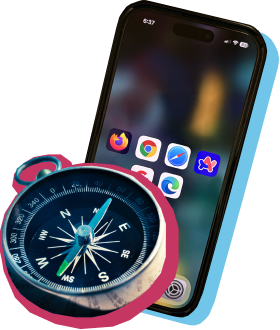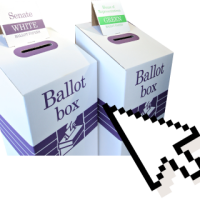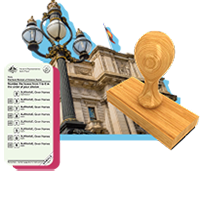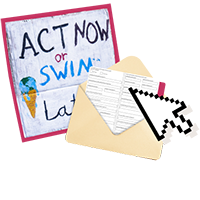
There is no shortage of information and different views expressed online. News outlets, social media, friends, and politicians are all broadcasting and sharing their own opinions.
Online spaces can also be a tool for young people to raise their voices, build community and have your say. But there are some things to consider before you interact online.
It is important to know where to go to find reliable information. This means avoiding unreputable sources containing misinformation or disinformation.
Informing yourself on an issue provides you with the knowledge and tools to influence change.
94%
of young people aged 18-24 access news and information online
Social media age restrictions
The Australian Government has introduced a mandatory minimum age of 16 for accounts on certain social media platforms. The change aims to protect younger users from accessing potentially harmful social media content and features that have been found to have a negative impact on stress, sleep and attention.
The responsibility for restricting accounts for those under 16 is on service providers. There will be no penalties for age-restricted users who gain access to an age-restricted social media platform. There will also be no penalties for their parents or carers.
The eSafety Commission has more information on the social media age restrictions that take effect in December 2025.
Staying safe online
No one should have to deal with online abuse (including image based abuse), bullying or exposure to illegal content.
Tips for staying safe online:
- Don’t feed the trolls – Resist the urge to respond to someone deliberately provoking an argument. Getting involved just gives them the reaction they want. It might even cause them to up the attack.
- You don’t have to cope with bullying on your own – Talking it through with an adult you trust can help you decide what to do and how to deal with any impacts.
- Online friends should respect your boundaries – Know how to get help if someone makes you feel uncomfortable or unsafe.
- Don't share your personal information – If someone online asks questions like where you live, who you live with and what you do, be suspicious and seek support from a trusted adult.
- Check your privacy settings - Check out the eSafety Guide to learn social media privacy settings and how to change them.
eSafety has useful guidance, tailored for young people, about staying safe online.
If you are experiencing serious online abuse, you can make a report to eSafety. They may be able to investigate the issue. They can also help you to protect yourself and deal with the experience (like help you find counselling and support).
What is misinformation?
Misinformation is information that is false, inaccurate or misleading. People usually share misinformation because they mistakenly believe it is true.
What is disinformation?
Disinformation is purposeful false information. Disinformation is shared with intent to deceive and influence public opinion. Disinformation may try to hide or confuse the truth.
What are trolls?
Online trolls are people who try to start arguments and stir up trouble in online spaces. They may post pointless or negative comments to purposely upset people.
Misinformation and disinformation
When navigating online spaces, it is important to be aware of misinformation. Sharing misinformation can damage your digital footprint and make you seem untrustworthy. It may even harm other people or groups.
Misinformation and disinformation are sometimes called “fake news”. The eSafety Commissioner has advice on how to spot and navigate fake news.
Watch out for content that targets strong emotions
Misinformation and disinformation often try to grab you by your emotions – whether it’s anger, fear, or excitement. If a headline or post makes you feel a strong emotion, take a moment to think whether that is the author’s intention.
With so many ways to get information these days, it can be tricky to determine what is true and what isn't.
Understanding bias
Bias is an inclination or prejudice for or against someone or something. Bias can be present in online content including:
- an uneven weight against or in favour of an idea or way of thinking
- a tendency to prevent impartial presentation of information
- interpreting information in ways that confirm existing beliefs or impede objective decision-making
- preconceived attitudes and impressions, stereotypes, and social perceptions.
Do your research and check sources before sharing information online
Check the source before you share online information with others. Accurate and trustworthy sources typically include:
- government websites such as the Australian Bureau of Statistics or Victorian Government
- ABC and SBS news sites
- Australian Associated Press (AAP) FactCheck who provide impartial analysis of current misinformation and disinformation circulating online
- university websites.
Remember to double-check information from different sources to verify it. This can help you avoid believing or sharing misinformation or disinformation.
Tips to verify a source
- Check the date: Old news, posts, or statistics can sometimes resurface on social media or in the news. Always check the information is up to date.
- Transparency: Is the publication or reporter clear about where the information came from and who shared it?
- Quality of evidence: Do multiple informed individuals and perspectives support the information?
- Accuracy: Does the source have a history of providing accurate information? Does it correct its errors?
- Adherence to the Journalist Code of Ethics: Does the source demonstrate to the principles of honesty, fairness, independence and respect for the right of others?
Engaging positively online
Engaging with your audience and peers is a great way to reach more people online. Respond to comments, ask questions, and join conversations – just remember the tone of your message can influence how it’s received.
Avoiding emotive language will help keep the conversation open and welcoming. Active and respectful participation shows you care and helps build a community around your cause.
Take a break when you need one
Balancing online activity with offline moments can keep you healthy and inspired.
Online spaces can be a powerful avenue for connecting and having your say, but they can also be overwhelming and stressful. Stepping away from the screen can help you clear your mind and relax. You can come back when you’re ready with fresh views and new energy.
Remember
- You are responsible for what you say in person and online
- Any information you share online should be accurate and something you would be comfortable saying in person
- Consider multiple points of view
- Be aware of overly biased content
- Avoid engaging with trolls and highly emotional content
- Don’t share your personal information online
- Ask for help if you need it.
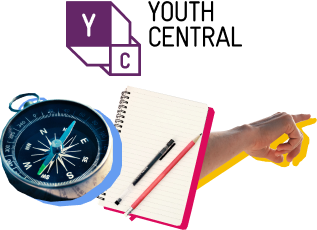
Ready to put your skills into practice?
Get comprehensive guidance on digital safety at Youth Central.


